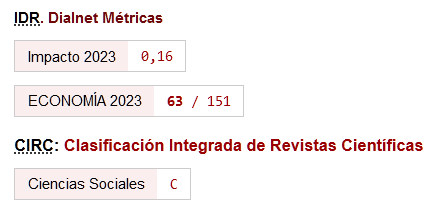Trade, super-exploitation of labor power and cycles in the periphery: a theoretical proposal and the Ecuadorian case through a PVAR model
DOI:
https://doi.org/10.46661/revmetodoscuanteconempresa.3731Keywords:
real competition, absolute cost advantages, super-exploitation, capitalist periphery, historical-cyclical trends, PVAR modelsAbstract
This paper theoretically interprets how international real capitalist competition pressures trade balances of the peripheral countries to depend on absolute cost advantages based on the super-exploitation of labor power and nature; dependence which creates cyclical dynamics within those countries. To reinforce such an interpretation, the paper takes as a study case the Ecuadorian peripheral capitalism, about which some historical-cyclical trends are presented as well as some examples of economic activities that seem to obtain their trade surplus through super-exploitation. Also, the paper estimates a PVAR model over a panel data of 43 economic activities observed during the period 2007-2016; from that estimation, it is found evidence of short-run cyclical dynamics among Ecuadorian economic activities. All the empirical results evidence the importance of the absolute cost advantages gained through super-exploitation of labor power and nature on the determination of trade balances and on the rise of cycles that reinforce the dependent condition of Ecuadorian capitalism.
Downloads
References
Abrigo, M., & Love, I. (2016). Estimation of panel vector autoregression in Stata. The Stata Journal, 16(3), 778-804.
Acosta, A. & Cajas-Guijarro, J. (2016a). Ocaso y muerte de una revolución que al perecer nunca nació. Ecuador Debate, 98, 7-28.
Acosta, A. & Cajas-Guijarro, J. (2016b). Patologías de la abundancia. Una lectura desde el extractivismo. En R. Domínguez (Ed.), Nada dura para siempre. Neo-extractivismo tras el boom de las materias primas (pp.391-425). Quito: Universidad Andina Simón Bolívar.
Acosta, A. & Cajas-Guijarro, J. (2018). Una década desperdiciada. Las sombras del correísmo. Quito: Centro Andino de Acción Popular.
Amin, S. (1974). La acumulación a escala mundial. Ciudad de México: Siglo XXI.
Amín, S., Bettelheim, C., Emmanuel, A., & Palloix, Ch. (1976). Imperialismo y Comercio Internacional (El intercambio desigual). Ciudad de México: Cuadernos Pasado y Presente.
Andrews, D., & Lu, B. (2001). Consistent model and moment selection procedures for GMM estimation with application to dynamic panel data models. Journal of Econometrics, 101(1), 123-164.
Apostolakis, G., & Papadopoulos, A. (2019). Financial Stability, Monetary Stability and Growth: a PVAR Analysis. Open Economies Review, 30(1), 157-178.
Arellano, M., & Bover, O. (1995). Another look at the instrumental variable estimation of error-components models. Journal of Econometrics, 68(1), 29-51.
Astarita, R. (2013). Economía política de la dependencia y el subdesarrollo. Tipo de cambio y renta agraria en la Argentina. Bernal: Universidad Nacional de Quilmes.
Botwinick, H. (1993). Persistent Inequalities. Wage disparity under capitalist competition. Princeton: Princeton University Press.
Boundi, F. (2017). Determinantes de las relaciones reales de intercambio de España con Alemania (1970-2010). Un análisis econométrico de la ventaja absoluta de costo intrasectorial. Cuadernos de economía, 36(71), 489-520.
Boundi, F. (2019). Tipo de cambio real y ventaja absoluta de costo: España, 2000-2014. Investigación Económica, 78(307), 119-45.
Brana, S, Djigbenou, M., & Prat, S. (2012). Global excess liquidity and asset prices in emerging countries: A PVAR approach. Emerging Markets Review, 13(3), 256-267.
Cajas-Guijarro, J. (2015). Clases sociales, desigualdad y subempleo en el capitalismo subdesarrollado. (Tesis de máster). Facultad Latinoamericana de Ciencias Sociales, Quito.
Cajas-Guijarro, J. (2018). La ley general de la acumulación capitalista: una reinterpretación. Revista Economía (Universidad Central del Ecuador), 70(111), 47-67.
Cajas-Guijarro, J., & Acosta, A. (2017). Con el correísmo de regreso al W.C. Una primera lectura al ciclo capitalista de la economía ecuatoriana entre 2000-2014. En A. López Andrade, D. Terán Pazmiño, y F. Hidalgo (Eds.), Desafíos del pensamiento crítico: Memorias del Décimo Congreso Ecuatoriano de Sociología y Política. Tomo I (pp.87-110). Quito: Universidad Central del Ecuador y CLACSO.
Canova, F., & Ciccarelli, M. (2004). Forecasting and turning point predictions in a Bayesian panel VAR model. Journal of Econometrics, 120(2), 327-359.
Carballa, S, Durand, C., & Knauss, S. (2016). Uneven development patterns in global value chains. An empirical inquiry based on a conceptualization of GVCs as a specific form of the division of labor. París: Centre d’Economie de l’Université de Paris Nord. Disponible en: https://cepn.univ-paris13.fr/download-attachment/8779/
Carchedi, G. (1991). Frontiers of Political Economy. Londres: Verso.
Dávila-Fernández, M., & Sordi, S. (2019). Distributive cycles and endogenous technical change in a BoPC growth model. Economic Modelling, 77, 216-233.
Dos Santos, T. (1970). The Structure of Dependence. American Economic Review, 60(2), 231-36.
Dussel, E. (2008). Hacia un Marx desconocido. Un comentario de los Manuscritos del 61-63. Iztapalapa: Siglo XXI y Universidad Autónoma Metropolitana.
Emmanuel, A. (1972). Unequal Exchange: A Study in the Imperialism of Trade. Nueva York: Monthly Review Press.
Gereffi, G. (2001). Las cadenas productivas como marco analítico para la globalización. Problemas del Desarrollo. Revista Latinoamericana de Economía, 32(125), 9-37.
Goodwin, R. (1967). A growth cycle. En C.H. Feinstein (Ed.), Socialism, Capitalism and Economic Growth: Essays Presented to Maurice Dobb (pp.54-58). Cambridge: Cambridge University Press.
Grinberg, N. (2016). Global Commodity Chains and the Production of Surplus-value on a Global Scale: Bringing Back the New International Division of Labour Theory. Journal of World-Systems Research, 22(1), 247-78.
Grossman, H. ([1929] 2004). La ley de la acumulación y del derrumbe del sistema capitalista: una teoría de la crisis. Ciudad de México: Siglo XXI.
Gudynas, E. (2009). Diez tesis urgentes sobre el nuevo extractivismo. En Extractivismo, política y sociedad (pp.187-225). Quito: Centro Andino de Acción Popular y CLAES.
Guerrero, D. (1995). Competitividad: teoría y política. Barcelona: Ariel.
Hadri, K. (2000). Testing for stationarity in heterogeneous panel data. The Econometrics Journal, 3(2), 148-161.
Hamilton, J. (1994). Time series analysis. Princeton: Princeton University Press.
Hansen, P. (1982). Large sample properties of generalized method of moments estimators. Econometrica, 50(4), 1029-1054.
Harvey, D. (2003). The New Imperialism. Nueva York: Oxford University Press.
Johnson, R. (2018). Measuring global value chains. Annual Review of Economics, 10, 207-36.
Kaplinsky, R., & Morris, M. (2000). A handbook for value chain research. Vol. 113. Otawa: Universidad de Sussex, Instituto de Estudios del Desarrollo.
Laibman, D. (1992). Value, Technical Change and Crisis: Explorations in Marxist Economic Theory. Nueva York: Routledge.
Lardic, S., & Mignon, V. (2002). Econométrie des séries temporelles macroéconomiques et financières. París: Economica.
Lee, L., & Yu, J. (2010). Estimation of spatial autoregressive panel data models with fixed effects. Journal of Econometrics, 154(2), 165-185.
Levin, A., Lin, C., & James, C. (2002). Unit root tests in panel data: asymptotic and finite-sample properties. Journal of Econometrics, 108(1), 1-24.
Love, I. & Zicchino, L. (2006). Financial development and dynamic investment behavior: Evidence from panel VAR. The Quarterly Review of Economics and Finance, 46(2), 190-210.
Marini, R.M. (1973). Dialéctica de la dependencia. Ciudad de México: ERA.
Marx, K. ([1867] 2009). El Capital. Crítica de la economía política. Libro primero. El proceso de producción del capital. Ciudad de México: Siglo XXI.
Marx, K. ([1894] 2009). El Capital. Crítica de la economía política. Libro tercero. El proceso global de la producción capitalista. Ciudad de México: Siglo XXI.
Melguizo, C. (2015). An analysis of the Okun s law for the Spanish provinces. AQR–Working Papers, 2015, AQR15/01. Barcelona: Universidad de Barcelona. Descargado de: https://www.ub.edu/irea/working_papers/2015/201501.pdf
Myrdal, G. (1957). Teoría económica y regiones subdesarrolladas. Ciudad de México: Fondo de Cultura Económica.
Noroña, S., & Cajas-Guijarro, J. (2014). Acumulación de capital, ejército industrial de reserva y su relación en la economía ecuatoriana. (Tesis de Ingeniería). Escuela Politécnica Nacional, Quito.
Osorio, J. (2015). El sistema-mundo de Wallerstein y su transformación. Una lectura crítica. Argumentos, 28(77), 131-153.
Pinto, A. (1969). Condiciones sociales e integración regional. El Trimestre Económico, 36(143), 395-413.
Prebisch, R. (1950). The economic development of Latin America and its principal problems. Nueva York: Naciones Unidas.
Prebisch, R. (1984). Power relations and market laws. Working Paper No. 35. Indiana: Universidad de Notre Dame, Helen Kellogg Institute for International Studies. Descargado de: https://kellogg.nd.edu/sites/default/files/old_files/documents/035_0.pdf
Ricardo, D. ([1817] 1951). On the Principles of Political Economy and Taxation. Cambridge: Cambridge University Press.
Ricci, A. (2019). Unequal Exchange in the Age of Globalization. Review of Radical Political Economics, 51(2), 225-245.
Seretis, S., & Tsaliki, P. (2016). Absolute advantage and international trade: Evidence from four Euro-zone economies. Review of Radical Political Economics, 48(3), 438-451.
Shaikh, A. (1980a). Foreign trade and the law of value: part II. Science & Society, 44(1), 27-57.
Shaikh, A. (1980b). The Laws of International Exchange. En E. Nell (Ed.), Growth, Profits and Property: Essays in the Revival of Political Economy (pp.204-235). Cambridge: Cambridge University Press.
Shaikh, A. (1990). Valor, acumulación y crisis. Bogotá: Tercer Mundo Editores.
Shaikh, A. (2008). Competition and Industrial Rates of Return. En P. Arestis & J. Eatwell (Eds.), Issues in Economic Development and Globalisation, Festschrift in Honor of Ajit Singh (pp.167-194). Basingstoke: Palgrave Macmillan.
Shaikh, A. (2016). Capitalism: Competition, conflict, crises. Oxford: Oxford University Press.
Smith, A. ([1776] 1973). The Wealth of Nations. Londres: Penguin Books.
Sotelo, A. (2017). Sub-Imperialism Revisited. Dependency Theory in the Thought of Ruy Mauro Marini. Boston: Brill.
Tokman, V., & García, N. (1981). Dinámica del subempleo en América Latina. Santiago de Chile: CEPAL.
Tsaliki, P., Paraskevopoulou, C., & Tsoulfidis, L. (2018). Unequal exchange and absolute cost advantage: evidence from the trade between Greece and Germany. Cambridge Journal of Economics, 42(4), 1043-86.
Tsay, R. (2005). Analysis of Financial Time Series. Nueva York: Wiley.
Tsoulfidis, L., & Tsaliki, P. (2005). Marxian Theory of Competition and the Concept of Regulating Capital: Evidence from Greek Manufacturing. Review of Radical Political Economics, 37(1), 5-22.
Tsoulfidis, L., & Tsaliki, P. (2019). Classical Political Economics and Modern Capitalism. Cham: Springer Nature.
Wallerstein, I. (2005). Análisis de sistemas-mundo. Una introducción. Ciudad de México: Siglo XXI.
Downloads
Published
How to Cite
Issue
Section
License
Copyright (c) 2021 Journal of Quantitative Methods for Economics and Business Administration

This work is licensed under a Creative Commons Attribution-ShareAlike 4.0 International License.
Submission of manuscripts implies that the work described has not been published before (except in the form of an abstract or as part of thesis), that it is not under consideration for publication elsewhere and that, in case of acceptance, the authors agree to automatic transfer of the copyright to the Journal for its publication and dissemination. Authors retain the authors' right to use and share the article according to a personal or instutional use or scholarly sharing purposes; in addition, they retain patent, trademark and other intellectual property rights (including research data).
All the articles are published in the Journal under the Creative Commons license CC-BY-SA (Attribution-ShareAlike). It is allowed a commercial use of the work (always including the author attribution) and other derivative works, which must be released under the same license as the original work.
Up to Volume 21, this Journal has been licensing the articles under the Creative Commons license CC-BY-SA 3.0 ES. Starting from Volume 22, the Creative Commons license CC-BY-SA 4.0 is used.










